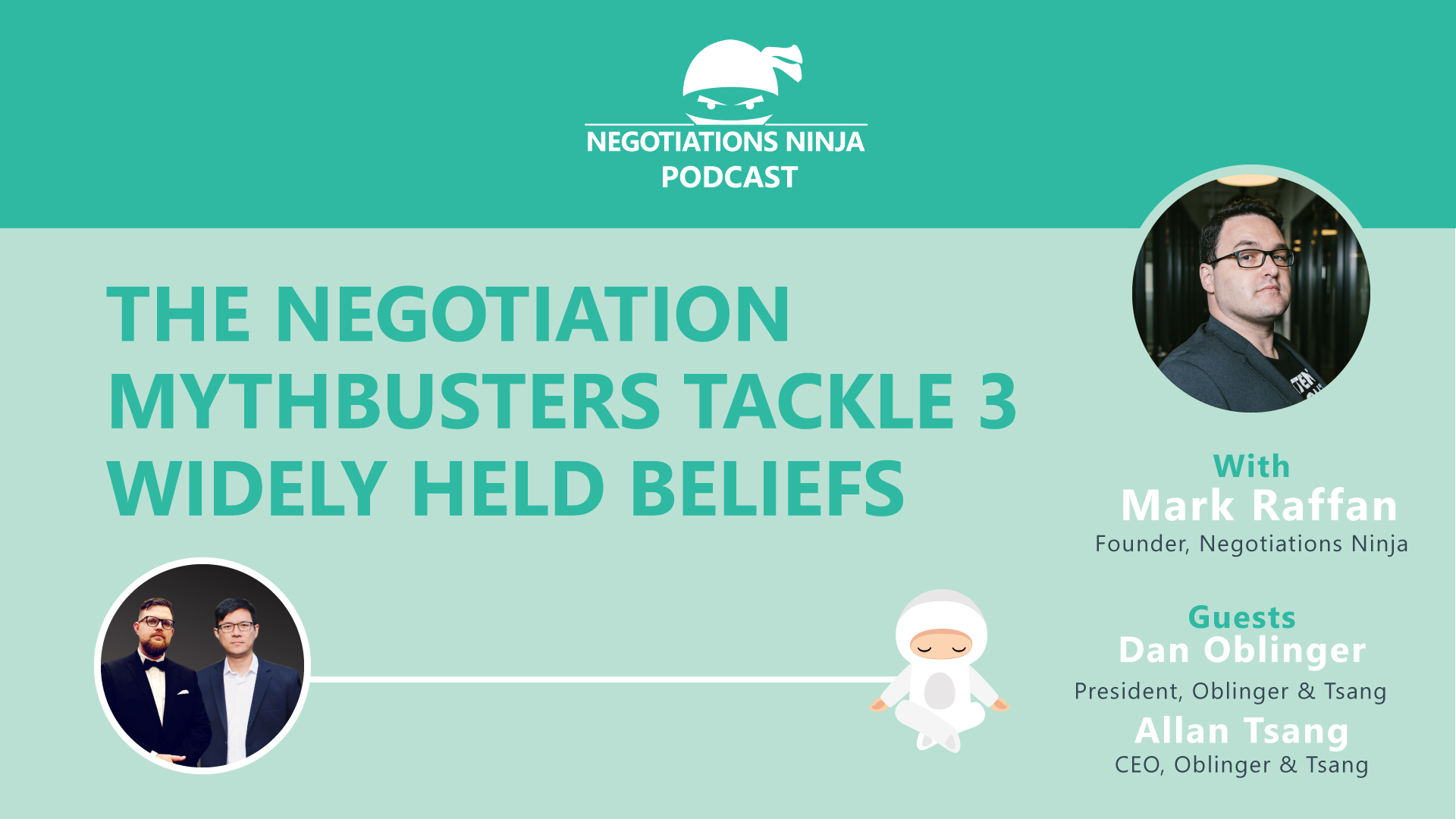When a bad idea is enshrined in an industry, the foundation you build your strategy on is weak at best. That’s problematic, right? That’s why you NEED to start questioning conventional “wisdom.” It’s what Dan Oblinger and Allan Tsang have done for years. It’s also the premise of their new book, “Negotiation Mythbusters: Rethinking Everything You Know About Building Strong Agreements.” In their book, they dissect 30 commonly held negotiation myths. In this episode of Negotiations Ninja, we tackled three myths from their book head-on. Don’t miss it!
Outline of This Episode
- [2:11] Learn more about Allan Tsang and Dan Oblinger
- [5:34] Dan & Allan are releasing a NEW book
- [9:26] Myth #3: Knowledge is power
- [14:49] Myth #5: Trust is a necessity
- [24:25] Myth #19: Negotiators are lone wolves
- [32:13] Who shouldn’t buy this book
- [35:36] How to get FREE knowledge from Dan & Allan
Negotiation Myths: Knowledge is power
The truth? Knowledge is seductive.
Knowledge is dangerous. Allan points out that knowledge is only potential power. If you have gunpowder that you scatter on the ground and light, it will just fizzle out. If you don’t light it, nothing happens. You need to know how to compact it and light it properly. In the same way, knowledge is meaningless if you don’t know how to apply it.
Memorizing, remembering, and understanding knowledge is passive learning. To move into active learning, you have to evaluate it, analyze it, apply it, and reflect upon it. Only a small percentage of people do this. The acquisition of knowledge is not the end goal. You have to create something new from your knowledge. Many people read every book but can’t execute what they’ve learned. You have to implement the knowledge. If you don’t, it’s useless. That’s why you need a coach.
We all offer workshops and training. But when a trainer is brought in, it’s like a social event for employees. They don’t have to work; they get to have lunch with each other, and they get to chit-chat. Two weeks later, they forget everything they’ve learned, and they’re doing business the old way. A coach helps you reflect, apply the knowledge, and enact change.
Negotiation Myths: Trust is a necessity
The truth? Trust is a luxury.
Everyone has heard some version of the phrase, “We only do business with people we like and trust.” It’s limiting at best.
When Allan runs a workshop, he’ll ask the crowd how many of them are married. It’s easily 70% or more. Most agreed that they trusted their significant other when they married them. Then he asks how many of them got divorced—and how many trusted their spouse afterward. Trust is fragile.
When you do business with someone, how can you have trust on the first day? You can’t. You simply like or dislike someone. People use the word “trust” when they should be using “rapport.”
Dan notes that the rule in hostage and crisis negotiations is that you don’t negotiate face-to-face with armed suspects. They use the phone. Why? Because face-to-face interaction is dangerous—you don’t trust the person you’re negotiating with. Sometimes he’s forced to negotiate face-to-face. So he’ll put on body armor, a helmet, and carry a pistol. It doesn’t signal trust and rapport. Dan knows that he might get shot, or he might shoot them.
What word is even better than rapport? Listen to hear Dan’s thoughts.
Negotiation Myths: Negotiators are lone wolves
The truth? Negotiators are usually lone wolves because they don’t have a choice.
Many people believe that team-based negotiations are a better approach. But you may not have the resources to apply a team approach to all of your negotiations. Allan points out that perhaps people justify the lack of resources by saying they prefer to work alone.
Dan and Allan agree that in business negotiations, you need at least three resources:
- Someone to negotiate
- Someone to coach you and help you develop a strategy
- A commander (i.e., the client or someone to defer important decisions to if needed)
The biggest concern about lone wolves is that they have no one to help them prepare beforehand or debrief afterward. If you’re engaging in the entire process by yourself, you’re incredibly disadvantaged. Why? Bias. It’s hard to detect bias caused by your emotions. You need a sounding board.
So if you don’t have resources available, what do you do? You have to decide when to allocate the resources you have to bring in other parties. Allan points out that this is where a system is critical.
Listen to the whole episode for more in-depth banter about these common negotiation myths (and what they think the right answer is).
Resources & People Mentioned
Connect with Dan Oblinger + Allan Tsang
Connect With Mark
- Follow Negotiations Ninja on Twitter: @NegotiationPod
- Connect with Mark on LinkedIn
- Follow Negotiations Ninja on LinkedIn
- Connect on Instagram: @NegotiationPod
- negotiations.ninja




